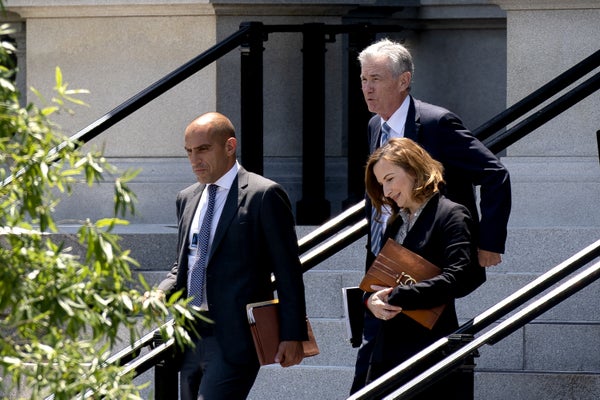Two more climate hawks soon could be at the helm of key financial agencies.
There’s a growing expectation that President Biden will tap another two climate-conscious officials to lead independent financial agencies that could help blunt the impact of global warming on the U.S. financial system.
Rostin Behnam, acting chair of the Commodity Futures Trading Commission, likely will be nominated to permanently lead the CFTC, which regulates the nation’s derivatives markets, according to news reports. Separately, Cornell University law professor Saule Omarova is a leading contender to head the Office of the Comptroller of the Currency, which oversees major U.S. banks.
On supporting science journalism
If you're enjoying this article, consider supporting our award-winning journalism by subscribing. By purchasing a subscription you are helping to ensure the future of impactful stories about the discoveries and ideas shaping our world today.
The appointments would mark a major win for Democrats, activists and experts who have raised alarms about the systemic threats posed by rising temperatures—and called on financial regulators to address them.
Behnam in particular has been credited with accelerating those efforts.
In 2019—Behnam’s second year as a member of the CFTC—he spearheaded the formation of a climate-focused subcommittee charged with producing a report about climate-related financial risk and policies that could address it.
The landmark document was released in September of last year. It marked the first time a federal agency had formally warned that climate change could upend U.S. financial stability.
Biden tapped Behnam in January to be the agency’s acting chair. In that role, he’s continued to address the challenge, including by creating a “Climate Risk Unit” charged with examining how derivatives markets could be used to lessen climate risk and accelerate the transition to a low-carbon economy.
The White House’s plan to make Behnam the chairman of the CFTC was first reported by Bloomberg and is not expected to happen immediately. The White House did not respond to a request for comment.
Omarova hasn’t been in the climate finance spotlight as much. But climate finance advocates welcomed recent reports that the financial regulation expert is being considered for the top spot at the OCC, in part due to her candor on a variety of emerging financial risks such as cryptocurrency and climate change.
According to The New York Times, which first reported the news, the White House is in the early stages of vetting Omarova. It could be months before an official nominee is announced.
Omarova has been a leading proponent of the idea that Congress should establish a National Investment Authority, a permanent federal entity charged with identifying and executing long-term economic development goals.
The proposal, which she outlined in a paper last year, would “fill the institutional gap” between the Treasury Department and Federal Reserve to invest public and private dollars into projects—climate-related among them—that lack funding.
“Leaving this effort in the hands of private actors and markets is not an option,” Omarova wrote in an article describing the proposal.
“The NIA would act directly in financial markets, actively allocating both public and private capital to where it’s most needed in our fight against climate change, inequality, and other structural ills,” she added. “We can call it industrial or developmental policy, a crucial supplement to the fiscal and monetary policies.”
The news comes as the Biden administration works to prepare two highly anticipated reports on the financial threats of climate change. Both documents were requested by Biden in a May executive order that called on top administration officials and Cabinet secretaries to prioritize the issue.
One report entails the development of a governmentwide strategy regarding the measurement, disclosure and mitigation of climate risks to the federal government.
The other will assess how financial regulators are tackling the challenge now—and what else they can do. Treasury Secretary Janet Yellen was charged with completing that report by mid-November alongside the members of the Financial Stability Oversight Council, which comprises the bosses of all the financial regulatory agencies including the OCC and CFTC (Climatewire, May 21).
Eric Juzenas, a counselor to the undersecretary of domestic finance at Treasury, told climate advocates during a meeting last week that the report is in progress and that the administration expects to meet the November deadline.
Reprinted from E&E News with permission from POLITICO, LLC. Copyright 2021. E&E News provides essential news for energy and environment professionals.
